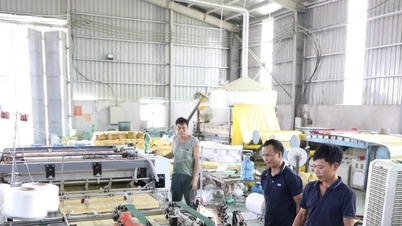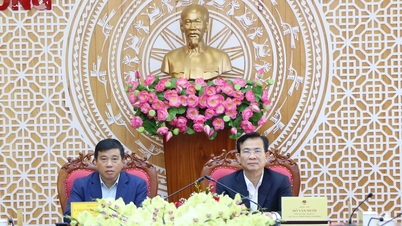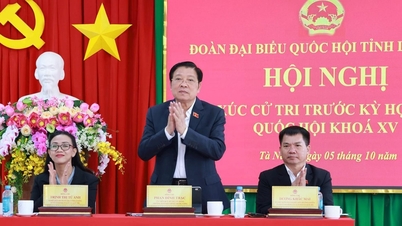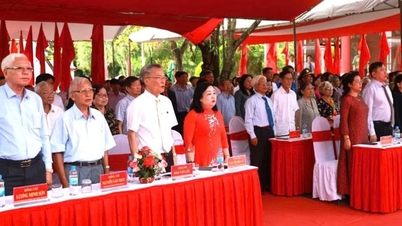"I chose a position with a low starting point to increase the chance of being selected," Ms. Hoai said about the interview at the end of June. Sitting next to her that day were nearly a dozen other candidates. All were younger, more familiar with social media and better at foreign languages. "While waiting for my turn, my hands were sweating and my heart was pounding," she said.
But when it was her turn, Hoai regained her composure. Her many years of work experience and flexible behavior helped her stand out. After two rounds of interviews, Hoai was selected. Early this August, she started her new job with a starting salary of 8.5 million VND. "After nearly 15 years of working, this is the first time I have entered the private sector," she said.

In Bac Giang , Ms. Nguyen Thi Thoi, 41 years old, also had to take a deep breath before entering an online interview with a recruiter in Germany.
"I was hired as a packaging staff at a German supermarket chain," said Ms. Thoi. She will soon go abroad and be arranged to work at a restaurant chain.
Both Ms. Hoai and Ms. Thoi are civil servants who have just retired after the downsizing and are now - at an old age - starting a new chapter in their lives.
Ms. Thoi used to be a civil servant of Doi Ngo town (new Bac Ninh province). After 15 years of working, she felt that her job was stable but she no longer had the motivation to develop. When Decree 178 on streamlining the apparatus was issued, she wrote a resignation letter.
She previously worked as an agent for an educational program, supporting students with online courses. Her husband also planned to expand the business and start a family company when she quit her job. "But I had bigger dreams," she said.
That dream originated from her eldest son’s desire to study in Germany. When she learned about the labor export program through degree conversion, she saw an opportunity for the whole family to go abroad, improve income and lay the foundation for their children’s future.
Since the beginning of 2025, she and her eldest son have started learning German, then persuaded her husband and second son to learn together. The eldest son has just finished his graduation exam and is studying the language to prepare for studying abroad, while his parents are planning to sponsor their 11-year-old son to come later.
The desire to leave the state has long been simmering in Ms. Thu Hoai, a propaganda officer in Da Nang, but only after Decree 178 was issued did she have the determination to end the label of "stable state".
Hoai submitted her resignation in early March. This decision worried her family, but she herself did not "walk in a daze". For the past 5 years, she has been quietly preparing for the biggest turning point in her life by learning about macroeconomics, finance, stocks, and real estate investment.
"When I read Decree 178, I saw it as a revolutionary policy. I saw the problems of myself and those around me, so I wanted to change," Hoai shared.
Voluntarily leaving the government is not easy, especially for those who have been accustomed to stability for many years. Hoai also struggled to learn how to write a CV and how to answer interviews. For four months after leaving, she hardly left her desk.
Another difficulty that few people know is the trade-off of title, position, income and familiar respect. "After more than 14 years working in the public sector, I won a central award and had achievements that many people dream of. But now I have to start from scratch when applying for a job, my age is noticed, my salary is only 2/3 of the previous one, and there is also the prejudice that 'the state is stagnant and conservative'," she said.
By the end of June, more than 43,200 officials and civil servants had resigned under the policy of streamlining the apparatus. This number includes both retirement and resignation. It is expected that about 90,000 more officials and civil servants will continue to leave the system under the streamlining roadmap, bringing the total number of resignations to about 113,000.
Leaving the public system, whether voluntary or policy, is creating a large wave of transition from the public sector to the free labor market. However, according to Ms. Nguyen Huyen Hao, a recruitment expert in Hanoi, not everyone is ready to integrate.
"This group of workers has an understanding of the administrative-legal system, systematic thinking and good communication skills, but lacks foreign languages, technology, digitalization, flexibility and dynamism," said Ms. Hao.
Navigos Group's Talent Guide 2025 survey also shows that the current labor market is being impacted by the double impact of the post-pandemic recovery process and the strong wave of digital transformation. Two prominent trends are the increase in human resource demand in fields such as artificial intelligence, data analysis, renewable energy; and the concept of "sustainable work" is increasingly being included in human resource development policies by many countries, including Vietnam.
To respond to these changes, businesses increasingly value skills such as problem solving, analytical thinking, effective communication, adaptability, creativity, and understanding of technology and foreign languages.
Faced with the reality of a large number of redundant public sector workers after the reorganization, Mr. Vu Quang Thanh, Deputy Director of the Hanoi Employment Service Center, said the city has developed a plan to support workers after the streamlining, including job counseling, vocational training support and recruitment connections. Decree 154 issued in mid-June also opens up vocational training opportunities for people under 45 who are working in jobs that are not in their field but wish to quit their jobs.
The center has collected recruitment needs from businesses, built a database and is ready to provide advice based on workers' abilities, to help them quickly return to the market. The unit also encourages businesses to accept and prioritize recruiting groups of workers leaving the public sector.
However, up to now, the center has not recorded any cases in the group of people who quit after downsizing and sought help finding a job.
In fact, many people have prepared themselves in advance. In addition, the subsidy received is not only a financial support, but also a springboard to help them start a new journey.
Like Ms. Hoai - who left her job with 955 million VND - entered the new environment with a very proactive mindset. "Working at school is a new experience, to me it is more meaningful than receiving a salary," she shared.
Officially quitting her job in early July, Ms. Thoi received a pension payment of more than 800 million VND. Part of it was paid for 5 more years of social insurance, ensuring her eligibility to receive 55% of her pension later. The rest was used for her family's overseas travel plan. According to the plan, she will fly within the next three months at the latest, followed by her husband and children.
This former civil servant hopes his story will motivate more than 100,000 people who quit their jobs after streamlining the apparatus.
"Leaving the state is not the end. It can open a new chapter, where the spirit of daring to think and daring to do is the most powerful passport," she said.
Source: https://baolamdong.vn/chuong-moi-cua-nhung-cong-chuc-sau-tinh-gian-386412.html


![[Photo] Prime Minister Pham Minh Chinh chairs the Government's online conference with localities](https://vphoto.vietnam.vn/thumb/1200x675/vietnam/resource/IMAGE/2025/10/5/264793cfb4404c63a701d235ff43e1bd)


![[Photo] Prime Minister Pham Minh Chinh launched a peak emulation campaign to achieve achievements in celebration of the 14th National Party Congress](https://vphoto.vietnam.vn/thumb/1200x675/vietnam/resource/IMAGE/2025/10/5/8869ec5cdbc740f58fbf2ae73f065076)

























































![[VIDEO] Summary of Petrovietnam's 50th Anniversary Ceremony](https://vphoto.vietnam.vn/thumb/402x226/vietnam/resource/IMAGE/2025/10/4/abe133bdb8114793a16d4fe3e5bd0f12)

![[VIDEO] GENERAL SECRETARY TO LAM AWARDS PETROVIETNAM 8 GOLDEN WORDS: "PIONEER - EXCELLENT - SUSTAINABLE - GLOBAL"](https://vphoto.vietnam.vn/thumb/402x226/vietnam/resource/IMAGE/2025/7/23/c2fdb48863e846cfa9fb8e6ea9cf44e7)




































Comment (0)